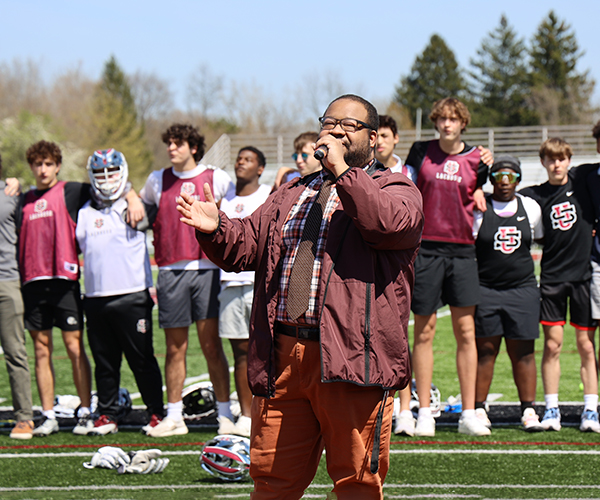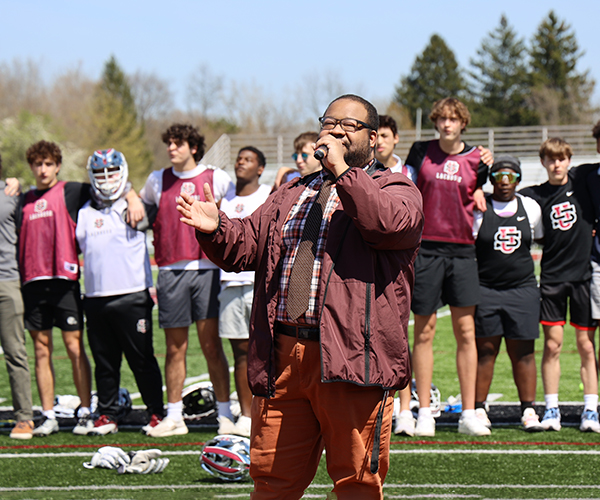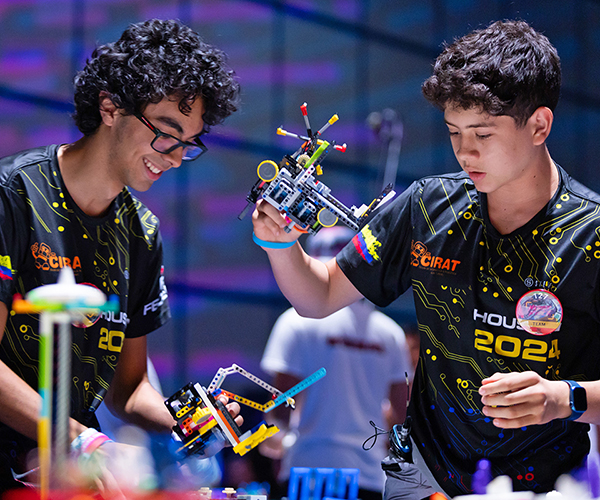The first time I knew I was completely unfit to parent was when my 2-year-old daughter threw a tantrum in a restaurant. It was 14 years ago, and at the time, I had no idea this incident was merely my initiation into the world of juvenile power struggles, territory that three kids later, has become familiar.
I’d harnessed her into a high chair and given her crackers, but the colorful plastic coffee flavorings with Irish cream and French vanilla caught her attention. She grabbed one. Her squeals of delight morphed into grunts of steely resolve as she clenched the creamer, squeezing its contents all over her new Winnie-the-Pooh jumper. I let her lick her sleeves and rub the goo in her hair for a while, figuring she’d tire of being sticky.
I’d harnessed her into a high chair and given her crackers, but the colorful plastic coffee flavorings with Irish cream and French vanilla caught her attention. She grabbed one. Her squeals of delight morphed into grunts of steely resolve as she clenched the creamer, squeezing its contents all over her new Winnie-the-Pooh jumper. I let her lick her sleeves and rub the goo in her hair for a while, figuring she’d tire of being sticky.
Not a chance. She screamed for another. I glanced at the civilized families around me, their kids, neatly dressed and using silverware. Was I going to let a toddler bully me into being an overly permissive parent? Heck, no! I was the mom, and I was going to make sure she knew who was in charge. I stuffed the creamers into the crevice between the booth’s cushions and the wall. There. All gone.
Fifteen minutes later, my ears were ringing. The table closest to us had moved to another room. Gabrielle had thrown her sippy cup and my coffee (black) at me.
My date gingerly asked if he could give her another coffee creamer. “And let her walk all over me? You’ve got to be kidding,” I said. Five minutes later, he was carrying foam takeout boxes to the car. I slung my daughter, kicking and screaming, over my shoulder and headed home, having proven that I was in complete control.
It wasn’t until I was washing her hair that night I realized a toddler had just kicked my butt. We’d had a mighty duel over coffee cream, but neither of us got what we’d wanted. We all left feeling miserable, and no one ate any dinner that night. Over what? An ounce of cream. If I had to do it over again, I’d have agreed to lose the battle to win the war.
Now that she’s nearly 16, and I’ve had countless other opportunities to exhibit my parenting inadequacy, I’ve learned something about giving in to get ahead. These days, I pay attention to what I battles I choose.
Pick Your Battles
Almost as soon as children realize they can control their environment, they start to experiment and push to find out how much power they truly have. This is normal, say local experts, and depending on the child’s choices, can either indicate a readiness for increased responsibility or may suggest that the youngster isn’t as conscientious as the parent would like to believe.
An effective way to avoid power struggles with children is to be up front about what the expectations are, and then choose to maintain a firm hand when it matters.
“It may sound strange, but toddlers and adolescents aren’t that different,” says Linda Pallock, assistant professor of human development and educational psychology at Cleveland State University. “They both want to assert independence. They both are strong-willed and can be reasoned with to different degrees. They’re both struggling for autonomy, but in different ways and with different consequences.”
Pallock suggests that parents offer choices with which everyone can be happy. For instance, when a 4-year-old girl begs to wear her faux glass slippers to preschool, her parents can give her a choice between two other, more appropriate pairs, rather than simply saying “no.” Neither may have been her original choice, but at least she’s got some freedom.
Robyn Selent, a Chardon mother of three children, 7, 5 and almost 1, concedes that expending energy on certain battles isn’t worth the emotional drain. When she had her 5-year-old daughter’s long hair cut to bob length, Denali developed the annoying habit of chewing the ends.
“The ends hung right near her chin, and for some reason, she thought she should put them in her mouth,” Selent says. “It was a habit that initially drove me nuts.” Selent spent about a week pleading with her daughter to wear her hair pulled back or at least not chew on it. Nothing doing.
“I realized I was going to get worn down on this one, so I let the battle go. It wasn’t unsafe; it was just annoying. And I knew she’d outgrow it. The struggle wasn’t worth it.”
Selent’s strategy is to focus her energy on important things. She’d rather her children take her seriously when she confronts issues of potentially dangerous behavior. “I don’t want them to get numb to my objections to what they’re doing when it doesn’t really matter,” she says. “And if I can get their input on issues and offer compromises, then everyone is OK. But when I do tell them to do something, they need to know I mean businesses. For instance, they have to hold my hand when we cross a street. There’s no compromise on that. Everyone needs to know what behaviors are tolerable and which ones aren’t.”
Empowering Kids at Appropriate Times
A reason many parents and children, find themselves in power struggles is because parents have given their kids too much power too soon. Knowing boundaries and setting clear expectations help avoid power struggles. But these limits must be respected. If parents give a lot of freedom to young children, they may be unwittingly making it easy for their kids to manipulate them later.
A reason many parents and children, find themselves in power struggles is because parents have given their kids too much power too soon. Knowing boundaries and setting clear expectations help avoid power struggles. But these limits must be respected. If parents give a lot of freedom to young children, they may be unwittingly making it easy for their kids to manipulate them later.
Dr. Sylvia Rimm, a clinical professor at Case Western Reserve University, director of the Family Achievement Clinic and author of “How to Parent so Children Will Learn,” often sees clients with power-struggle issues.
“There’s a lot of power struggling with children who have been over-empowered too young, and as they mature, their plans get bigger and bolder,” she says. “They want to prove they can do whatever they want. Limits are more difficult for parents to set once an overly permissive pattern has been established. By then, teens are good at pushing their parents’ buttons. Rational parents can only take so much, and then they overreact. Kids feel power in making adults feel guilty. The good news is that this is learned behavior, and it can be unlearned.”
Rimm tells the story of a 13-year-old girl who wouldn’t do anything around the house. She continually argued with her parents and told of her plans to become a lawyer. “She was excellent at manipulating her father against her mother,” Rimm says, adding that this is a classic problem. “All she had to do was get him on her side, and the fight would escalate. Many kids are masters at this.”
Pulling the reins in, even just for one incident, makes the child feel deprived. Out comes the arsenal of wicked words and spiteful glances. Because it’s often easier to simply give in than hold their ground, many parents acquiesce, and it’s not over little matters like hair biting or coffee cream. It’s over tattoos, body piercing, explicit movies and parties.
If teens feel they can gain power by experimenting with these things, they often will. And once adolescents feel confident they can play their parents, they may expand to school where they’ll take on teachers. These teens don’t have clear boundaries of appropriate behavior or expectations, often because their parents have been afraid to enforce them.
“And this doesn’t give them any true self-confidence,” Rimm says. “It just makes them better manipulators. Parents aren’t doing their kids any good by simply giving in on matters they feel strongly about. The real world doesn’t like to be manipulated, and these kids will have to learn, sooner or later, that this behavior ultimately doesn’t give them any authentic power.”
What Parents Can Do
Rimm suggests parents apply a “V” rule to their children. When kids are young, their freedom, power and choices should be at the bottom of the “V” — very narrow. “Give young children and elementary-age kids only a few choices,” she says. “They’re under your rule. It’s easier now to let them know what you expect and what you’ll allow. This doesn’t mean you have to be extra firm over little things. Know what matters and enforce those things. Establish what’s important so kids will learn to respect rules and other people.”
Rimm suggests parents apply a “V” rule to their children. When kids are young, their freedom, power and choices should be at the bottom of the “V” — very narrow. “Give young children and elementary-age kids only a few choices,” she says. “They’re under your rule. It’s easier now to let them know what you expect and what you’ll allow. This doesn’t mean you have to be extra firm over little things. Know what matters and enforce those things. Establish what’s important so kids will learn to respect rules and other people.”
By middle school, children should be at the middle of the “V.” Parents can expand the choices they’ll permit. By increasing kids’ freedoms, these children believe they’re being empowered, but they’re not being given the world. And finally, during high school, freedoms can move to the top of the “V.” As these young adults emerge from their family life and enter the world, they’ll have had a solid grounding of appropriate expectations.
Parents should present a united front to their kids, Rimm says, even if one parent or caregiver isn’t completely sold on the other’s idea. The important thing is to establish boundaries for the teen to abide by. If a parent has to compromise, then he’s actually modeling the very behavior he’s trying to teach.
Parents who listen to their teens and thoughtfully offer a couple reasons are far more likely to avoid prolonged power struggles than parents who simply yell, “No! Because I’m the parent and I said so!”
It’s not necessary to answer immediately. “If you need to take a few hours or a day to come up with an answer, he’ll be patient, because he’s still hoping for a ‘yes,’ ” Rimm says. “When you do address the issue, offer no more than a couple choices. Don’t turn it into a lecture.”
If the adolescent persists in a power struggle, be final: Review the conversation and walk away. If you have to, assertively go to your room and close the door. Don’t play the child’s power games.
“This kid is interested in winning,” Rimm says. “He wants to wear you down. So, don’t refer to him as a lawyer and subtly praise the very quality he’s using against you.”
Once the teen gets used to your positive and reasonable parental behavior, he’ll realize he has to come up with a new plan that includes others.
Of Coffee Cream and Curfews
Since the pivotal coffee-cream war, I’ve been in more power struggles with my four kids (16, 9 and 7-year-old twins) than I care to try counting. I’ve found that paying attention to what precedes a battle can be a good indicator of future situations to avoid. If I know staying out late is important to my teen, and I want her home early on a certain night, I can often elude a struggle simply by giving her one good reason before she brings it up. The trick is that the reason can’t be focused on me alone. It’s got to affect others in the family.
Since the pivotal coffee-cream war, I’ve been in more power struggles with my four kids (16, 9 and 7-year-old twins) than I care to try counting. I’ve found that paying attention to what precedes a battle can be a good indicator of future situations to avoid. If I know staying out late is important to my teen, and I want her home early on a certain night, I can often elude a struggle simply by giving her one good reason before she brings it up. The trick is that the reason can’t be focused on me alone. It’s got to affect others in the family.
I’ve also found it’s helpful to spend a little time each week with each child on a one-on-one basis and do something that’s important to that particular kid. No agendas on my part. Even 15 minutes of working a jigsaw puzzle or making applesauce (apples take a while to peel and chop) with a kid makes her feel important. It’s harder, then, for that kid to initiate a battle with someone (me) who’s shown interest in her. It’s not foolproof, but it helps.
“Common sense is at the heart of knowing how to handle power struggles,” Pollack says. “There’s no one magic rule. Sometimes parents should just walk away. Sometimes not. Know what’s worth fighting over. But respecting each other and knowing what everyone expects goes a long way in helping avoid power struggles.”



